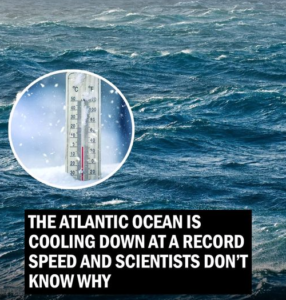Recent climate change has led to unexpected shifts in the Atlantic Ocean’s temperatures. Although global warming has caused increasingly intense summers, scientists have observed that the Atlantic Ocean has been cooling at a record pace, with temperatures 1 to 2 degrees lower than expected.
This cooling trend is puzzling, as NOAA data shows record-high temperatures due to El Niño, but a surprising early La Niña transition may be contributing to the temperature drop. These changes could impact weather patterns, potentially increasing hurricane activity and affecting rainfall. Carbon dioxide levels, linked to both historical ice ages and modern climate change, also play a significant role. As urbanization raises CO2 emissions and reduces vegetation, the ocean’s plankton and algae might not fully compensate, leading to potential environmental repercussions and a more severe winter and hurricane season.






